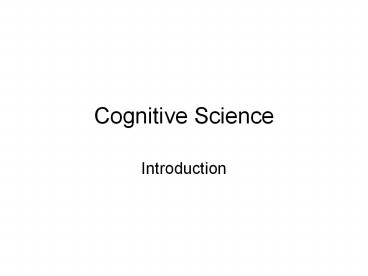Cognitive Science - PowerPoint PPT Presentation
Title:
Cognitive Science
Description:
Cognitive Science Introduction Overview Aims and learning outcomes Assessment Programme Cognitive science is interdisciplinary Cognitive science uses formal models ... – PowerPoint PPT presentation
Number of Views:95
Avg rating:3.0/5.0
Title: Cognitive Science
1
Cognitive Science
- Introduction
2
Overview
- Aims and learning outcomes
- Assessment
- Programme
- Cognitive science is interdisciplinary
- Cognitive science uses formal models
- Beware
- This strategy might not succeed (!)
- Fashion can influence the perception of research
3
Aims
- To introduce interdisciplinary approaches to the
study of higher cognitive processes - To familiarise you with computational and other
formal modelling - To illustrate the application of modelling to
cognitive processes
4
Learning outcomes
- To gain direct experience of computational and
other formal modelling techniques. - To integrate material across areas within
psychology and across traditional subject
disciplines. - To compare and critically evaluate formal
techniques in relation to empirical findings. - To tackle key theoretical problems in cognitive
science, particularly problems linked by the
theme of common sense reasoning.
5
Assessment
- Two hour examination in June, which counts for
two thirds of the mark. - Three pieces of coursework (counting for 4, 4,
and 25 respectively of the course mark) - Coursework assesses the first and, to a lesser
degree, the third learning objectives. - The exam will assess learning objectives two,
three and four.
6
Coursework
- AW 1 - Connectionist modelling 1 (4)
- AW 2 - Connectionist modelling 2 (4)
- Modelling project (25)
7
Programme
- 1 Introduction - why cognitive science?
- 2 Cognitive modelling
- 3 Cognitive modelling
- 4 Cognitive modelling
- 5 Cognitive modelling
- 6 The development of concepts
- 7 Learning word meanings
- 8 Ambiguous words
- 9 Compositionality and word meaning
- 10 Common-sense reasoning
8
Cognitive Modelling
- Project construct a model of adjective-noun
combination - red apple
- fake gun
- heavy baby / heavy elephant
9
Cognitive Modelling
Learns by training over and over
Heavy baby
NODES nodes 4 inputs 6 outputs 2 output
nodes are 1-4 CONNECTIONS 1-4 from i1 i6
Distributed 3 .7 .3 .4 .6 .5 .9 .4 .6 .6 .5 .2 .2
Baby
Heavy
Distributed 3 .2 .3 .7 .2 .4 .6 .2 .3 .5 .8 .4
.6 .2 .3 .6 .4 .2 .2
10
The development of concepts
- What do we mean concept?
- Why is concept learning tricky to understand?
- Connectionist nets as a simple model of concept
learning - Some features of natural concept learning that
make the picture less simple - e.g. Role of existing background knowledge
11
Learning word meanings
- Gavagai
12
Ambiguity and vagueness
- Complex links between words and concepts
- Bank
- Newspaper
- To paint
13
Combining concepts
- Compositionality is key to language
- red apple, red brick, red mist
- Watergate, blood gate, Stargate
14
Commonsense reasoning
- Which information is relevant to drawing a
conclusion? - Which facts are affected by an event?
- Yale shooting problem
- Property inheritance
- Tweety is a bird. So, Tweety can fly?
15
A little history the Cognitive Revolution
- Skinner (1957)
- Children learn words (language) through
operant conditioning - - stimulus controls response
- Chomsky's (1959) review of Verbal Behavior
- (link on course web pages)
- "Dutch" - what stimulus? proliferate
"stimuli - but role of attention etc. ? mind
- 'Creativity' of language ? compositionality
16
- Technical concepts of Skinner's behaviorism
(stimulus, reinforcement, operant etc.) were used
non-technically in "Verbal Behavior - Eg. the artist is reinforced by the effects his
work may have on others - but the artist's (often) not there when these
effects occur. It's not like reinforcement in a
Skinner box.
17
- "I now believe that mind is something more than a
four letter Anglo-Saxon word - human minds exist
and it is our job as psychologists to study
them." - Miller (1962) in American Psychologist, 17, p.
761 - Nb Piaget, even Freud, were always cognitively
oriented
18
Chomsky (1957 1965)Transformational Generative
Grammar
- Account for syntactic facts (linguistics)
- e.g. active and passive have same meaning
- Judge facts using 'intuitions' (psychology)
- ? the resulting grammars are related to something
people know - (linguistic competence)
19
A small transformational generative grammar
- S ? NP, VP
- NP ? determiner, noun
- VP ? verb, NP
- determiner the, a noun boy, dog verb eat,
kick, bite, occur - Passive transformation (simplified)
- NP1, V, NP2 ? NP2, BE, V, EN, by, NP1
- Captures the fact that selection restrictions
match - Congress impeaches Clinton Charlie impeaches a
shoe - Clinton is impeached by Congress A shoe is
impeached
20
- Congress impeaches Clinton
- NP1 V NP2
- Rule
- NP1, V, NP2 ? NP2, BE, V, EN, by, NP1
- Clinton is impeached by Congress
21
More history early machine translation
- Weaver (1949) memorandum
- Georgetown (1954-66)
- 250 words 6 rules at start
- Alpac Commission (1966)
- speed? cost? quality?
- Meteo (1977)
- English ? French
- Use existing materials (style sheets)
- Translators involved
22
Fashion and the life cycle of (some) AI projects
- Oblivion, fading ? Rebirth ? Excitement ? Claims
? More excitement ? Wild claims ? Unmet
expectations - ? Fading, oblivion.
23
Cognitive science now
- "higher" cognitive functions processes
representations - Interdisciplinary
- Psychology, linguistics, philosophy, computer
science, brain sciences, anthropology, . - Use formal / explicit models
- Computational metaphor
- strong v. weak
24
- The original question "Can machines think? I
believe to be too meaningless to deserve
discussion. - Alan Turing
- www.warwick.ac.uk/psrex/cogsci.html
25
- The end































